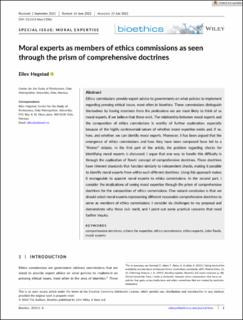Moral experts as members of ethics commissions as seen through the prism of comprehensive doctrines
Peer reviewed, Journal article
Published version
Permanent lenke
https://hdl.handle.net/11250/3053954Utgivelsesdato
2022Metadata
Vis full innførselSamlinger
- Publikasjoner fra Cristin [3269]
- SPS - Documents [424]
Originalversjon
https://doi.org/10.1111/bioe.13086Sammendrag
Ethics commissions provide expert advice to governments on what policies to implement regarding pressing ethical issues, most often in bioethics. These commissions distinguish themselves by having members from the professions we are most likely to think of as moral experts, if we believe that these exist. The relationship between moral experts and the composition of ethics commissions is worthy of further exploration, especially because of the highly controversial nature of whether moral expertise exists and, if so, how, and whether, we can identify moral experts. Moreover, it has been argued that the emergence of ethics commissions and how they have been composed have led to a “thinner” debate. In the first part of the article, the problem regarding checks for identifying moral experts is discussed. I argue that one way to handle this difficulty is through the application of Rawls’ concept of comprehensive doctrines. These doctrines have inherent standards that function similarly to independent checks, making it possible to identify moral experts from within such different doctrines. Using this approach makes it manageable to appoint moral experts to ethics commissions. In the second part, I consider the implications of seeing moral expertise through the prism of comprehensive doctrines for the composition of ethics commissions. One natural conclusion is that we should select moral experts representing different reasonable comprehensive doctrines to serve as members of ethics commissions. I consider six challenges to my proposal and demonstrate why these lack merit, and I point out some practical concerns that need further inquiry.

